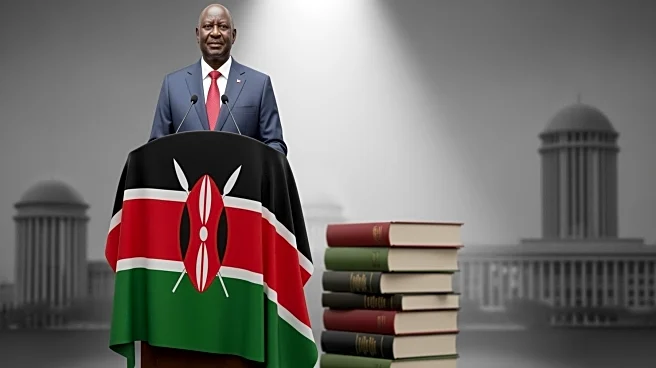What's Happening?
Raila Odinga, a former Prime Minister of Kenya and a significant figure in African politics, passed away at the age of 80. Odinga died in India while receiving treatment for a cardiac arrest. Known for his
advocacy for multiparty democracy, Odinga was a five-time presidential candidate who never won but played a crucial role in Kenya's political reforms. His efforts led to the establishment of multiparty democracy in 1991 and the adoption of a new constitution in 2010. Odinga's political career was marked by his challenges to election results, notably in 2017 when Kenya's highest court annulled the presidential election results, leading to a rerun that he boycotted.
Why It's Important?
Odinga's death is significant as he was a pivotal figure in Kenya's political landscape, often seen as a symbol of resistance and reform. His passing leaves a void in Kenyan politics, raising questions about who will continue his legacy of advocating for democratic freedoms and human rights. Odinga's influence extended beyond Kenya, impacting regional politics and inspiring movements for democracy across Africa. His ability to mobilize masses and challenge electoral processes has left a lasting impact on Kenya's political system, making his death a moment of reflection on the future of political activism in the country.
What's Next?
Following Odinga's death, a state funeral with full military honors is planned, reflecting his stature in Kenyan politics. The funeral will be held at Nyayo National Stadium in Nairobi, followed by burial at his farm in Bondo. The Kenyan government has declared a seven-day period of mourning, and political leaders from across Africa are expected to attend. Odinga's supporters are likely to continue his legacy, advocating for political reforms and democratic processes. The political landscape in Kenya may see shifts as leaders and parties realign in the absence of Odinga's influence.
Beyond the Headlines
Odinga's legacy as a political mobilizer and advocate for democracy highlights the ethical and cultural dimensions of leadership in Africa. His life story underscores the challenges faced by political leaders in advocating for change within systems resistant to reform. Odinga's ability to reconcile with opponents after contentious elections demonstrates a commitment to national unity, offering lessons in political diplomacy and conflict resolution. His death prompts reflection on the role of political figures in shaping democratic processes and the importance of maintaining momentum for reform in the face of adversity.









